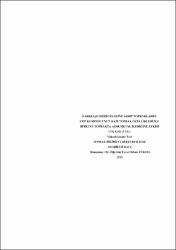| dc.contributor.author | Atav, Volkan | |
| dc.date.accessioned | 2019-12-25T13:13:43Z | |
| dc.date.available | 2019-12-25T13:13:43Z | |
| dc.date.issued | 2018 | |
| dc.identifier.uri | https://hdl.handle.net/20.500.11776/3312 | |
| dc.description.abstract | Kompostlama belediye katı atıklarının yok edilmesi için en fazla tercih edilen yöntemlerden birisidir. Belediye katı atıklarından elde edilen çöp kompostları birçok ülkede organik toprak düzenleyici ve gübre olarak tarım alanlarında yaygın olarak kullanılmaktadır. Ancak, çöp kompostları tarım alanlarında bazı olumsuz etkilere neden olabilir. Çöp kompostlarının ağır metal ve tuz içerikleri tarımsal alanlarda kullanılmadan önce bilinmesi gereken etkenlerden biridir. Bu çalışmanın amacı farklı pH’ya sahip topraklarda çöp kompostunun toprak ve arpa bitkisinde ağır metal içeriklerine ve bazı toprak özelliklerine etkisini incelemektir. Deneme 3 tekerrürlü saksı denemesi olarak kurulmuştur. Çöp kompostu kuru ağırlık üzerinden 0, 5, 10, 15 t da-1 oranlarında saksılara uygulanmıştır. Araştırma sonuçlarına göre kompost uygulaması toprakların Cu ve Zn içeriklerini istatistiki olarak önemli (P<0.01) düzeyde arttırırken Pb, Ni, Mn ve Fe içeriklerine etkisi önemli bulunmamıştır. Çöp kompostu bitkilerin Zn ve Cu içeriklerini (P<0.01) önemli düzeyde arttırırken Pb ve Ni içeriklerine etkisi önemli bulunmamıştır. Kompost uygulamasının hiçbirinde hem toprak hem de bitkide ağır metal içerikleri sınır değerleri aşmamıştır. Toprak-bitki transfer katsayısına göre bitkilerin topraktan aldıkları ağır metal içerikleri (tüm ağır metallerde) asit topraklarda en yüksek sonuçları vermiştir. Araştırma sonuçlarına göre çöp kompostu uygulaması tüm topraklarda organik karbon, elektriksel iletkenlik (EC), katyon değiştirme kapasitesi (KDK) ve asit toprakların pH sını yükseltmiştir. Toprakların tuz miktarları sınır değerleri aşmasa da kompost uygulaması toprakların tuz içeriklerini önemli düzeyde arttırmıştır. Araştırma sonuçları göstermiştir ki denemede kullanılan çöp kompostu besin elementi noksanlığı görülen alanlarda Zn ve Cu kaynağı olarak kullanılabilecek bir materyaldir. Ayrıca yüksek organik madde içeriği nedeni ile iyi bir toprak düzenleyici olabileceği bu araştırmada ortaya konulmuştur. | en_US |
| dc.description.abstract | The waste compost, derived from city solid waste, are commonly used as an organic soil regulator and a fertilizer in agriculture areas in many countries. However, the waste compost may cause some negative effects in agriculture areas. The heavy metal and salt contents of waste composts are one of the factors that must be known before using them in agriculture areas. In this study, the effects of the waste compost on some properties of soil with different pH, heavy metal content of soil and heavy metal content of plant grown on it (barley). The study was carried out as pot experiment with three replications. The waste compost was applied to the pots in the rates of 0, 5, 10, 15 t da-1 (dry weight). According to the results of study, compost application significantly increased the Cu and Zn contents of the soils. However, compost application didn't cause an important increase in the contents of Pb, Ni, Mn and Fe. Application of waste compost increased Cu and Zn contents of the plants significantly (P<0.01), but it had no effect on Pb, and Ni contents of plants. None of the compost application has increased heavy metal content above the upper limit values in both soil and plants. According to soil-plant ratio, plants grown on asidic soils had the highest level of heavy metal contents (in the all heavy metals). According to the study results, the waste compost application increased organic carbon, electrical conductivity (EC), cation exchange capacity (CEC) and pH (in acidic soils) in all soils. The compost application increased the salt content of the soil significantly (P <0.01), although the soil salt contents did not exceed the limit values. The research results showed that the waste compost which was used in study, is a material that can be used as Zn and Cu source in the fields where the nutrition element deficiency is observed. Also, in this study, it is revealed that the waste compost can be a good soil regulator due to the reason of its high organic matter content | en_US |
| dc.language.iso | tur | en_US |
| dc.rights | info:eu-repo/semantics/openAccess | en_US |
| dc.subject | Çöp kompostu | en_US |
| dc.subject | Toprak | en_US |
| dc.subject | PH | en_US |
| dc.subject | Ağır metal | en_US |
| dc.subject | Arpa | en_US |
| dc.subject | waste compost | en_US |
| dc.subject | soil | en_US |
| dc.subject | heavy metals | en_US |
| dc.subject | barley | en_US |
| dc.title | Farklı PH derecelerine sahip topraklarda çöp kompostunun bazı toprak özellikleri ile bitki ve toprakta ağır metla içeriğine etkisi | en_US |
| dc.title.alternative | THE EFFECT OF WASTE COMPOST ON SOIL PROPERTIES AND HEAVY METAL CONTENT OF PLANT AND SOILS WITH DIFFERENT pH LEVEL | en_US |
| dc.type | masterThesis | en_US |
| dc.department | Enstitüler, Fen Bilimleri Enstitüsü, Toprak Bilimi ve Bitki Besleme Ana Bilim Dalı | en_US |
| dc.relation.publicationcategory | Tez | en_US |



















